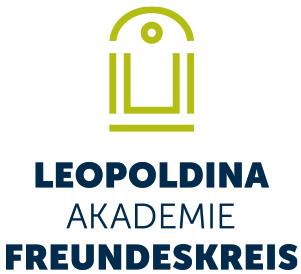Johann-Lorenz-Bausch Scholarship
The Leopoldina Academy Circle of Friends reg. ass. awards the Johann-Lorenz-Bausch-Scholarship once more for 2023. It can be awarded to a person for a time of up to four months. Its worth comes to 1,600 Euros per month for graduate students and 2,300 Euros for postdoctoral applicants. Travels to and from abroad can be granted additionally to the aforementioned sum. The scholarship is meant for graduate students and scientists who work in the field of history of science in a narrower or broader sense. Workplace for the entire funding period is the Centre for Science Research of the Leopoldina in Halle (Saale).
Before its transformation into a scholarship, the Leopoldina Academy Circle of Friends reg. ass. had already awarded the “Johann-Lorenz-Bausch-Förderpreis” (Johann-Lorenz-Bausch-Advancement Award), worth 5,000 Euros, to extraordinary scientists to be, who worked in the field of history of science in a narrower or wider sense.
Johann Lorenz Bausch
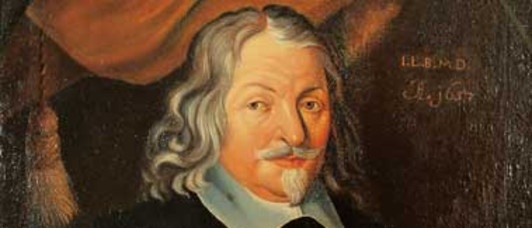
Portrait Johann-Lorenz-Bausch Picture: Leopoldina Archive
The physician Johann Lorenz Bausch (* 30 September 1605 in Schweinfurt; † 17 November 1665 in Schweinfurt) founded the Academia Naturae Curiosorum, today’s National Academy of Sciences Leopoldina, together with Johann M. Fehr, Georg B. Metzger and Georg B. Wohlfahrt on 1 January 1652 in Schweinfurt. He was also its first president until the end of his life.
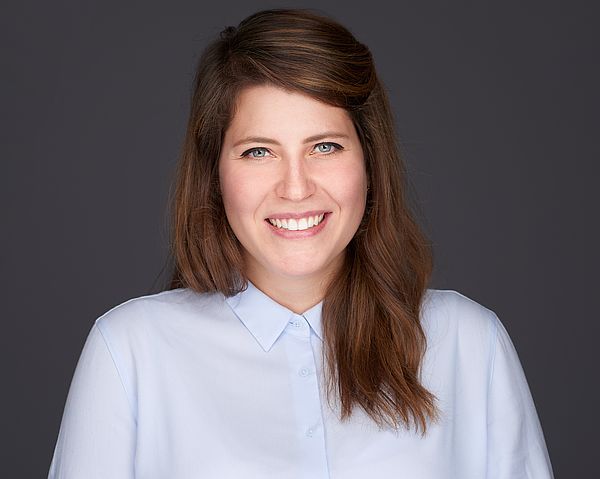
Bausch Scholarship 2021: Josephine Musil-Gutsch
“Disciplinary genesis between the natural sciences and the humanities: The historian of chemistry Edmund von Lippmann as a pioneer in the history of science”
The Leopoldina Academy Circle of Friends reg. ass. once again awarded the Johann-Lorenz-Bausch-Scholarship in 2021. At that time, itwas worth a maximum of €5,000 and named after the Academy's founder Johann Lorenz Bausch. The scholarship is aimed at young academics who are working in the field of history of science, in the narrower and in the broader sense. The place of work during the maximum four-month funding period is the Leopoldina Centre for Science Research in Halle (Saale).
The biography of the scientist and Leopoldina member Edmund Oskar Ritter von Lippmann (1857-1940) is characterised by a remarkably multi-layered activity at the interface of industry, the natural sciences and the humanities. As a chemist, Lippmann was a leading expert in the sugar industry around 1900. But during the course of his life, he was also always a historian of science. Lippmann devoted himself fully to his work in the history of science from 1925 onwards at the University of Halle, when it created a professorship for him in the history of chemistry. Such a professorship was an absolute novelty in the German academic landscape. It marked the beginning of the institutionalisation and professionalisation of German history of science. Lippmann's numerous publications on the history of science suggest the decisive contribution he made to the then young field. As part of her fellowship, Josephine Musil-Gutsch will study Lippmann's significance for the history of German science in detail. The Leopoldina also played an important role in this: the idea of appointing Lippmann to the professorship for the history of chemistry in Halle arose in the Academy's meetings.
Bausch Scholarship 2020: Tracy Wietecha
"German Scientists, their Observationes, and Institutional Ties to the New Worls in the Seventeenth Century"
The Leopoldina Academy Circle of Friends reg. ass. once again awarded the Johann-Lorenz-Bausch-Scholarship in 2020. It is worth a maximum of €5,000 and named after the Academy's founder Johann Lorenz Bausch. The scholarship is aimed at young academics who are working in the field of history of science, in the narrower and in the broader sense. The place of work during the maximum four-month funding period is the Leopoldina Centre for Science Research in Halle (Saale).
The subject of the project is the transatlantic exchange of scholars between Europe and America, particularly with regard to medicine and with special focus on the import of knowledge from the New World. She is specifically interested in Jacobus Lachmund, ML, and the results of his 1624 journey.
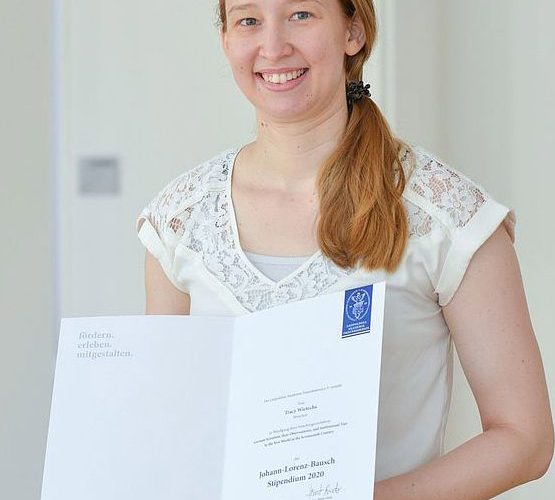
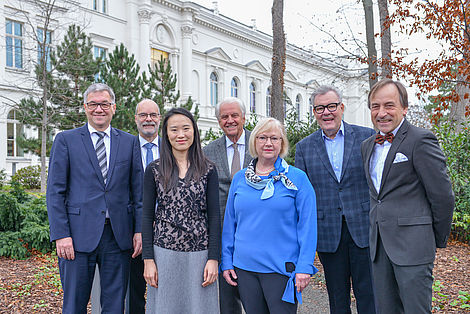
Bausch Scholarship 2019: Wenrui Zhao
"Dissecting Sight: Vision and Certainty at the Academia Naturae Curiosorum"
The Leopoldina Academy Circle of Friends reg. ass. once again awarded the Johann-Lorenz-Bausch-Scholarship in 2019. It is worth a maximum of €5,000 and named after the Academy's founder Johann Lorenz Bausch. The scholarship is aimed at young academics who are working in the field of history of science, in the narrower and in the broader sense. The place of work during the maximum four-month funding period is the Leopoldina Centre for Science Research in Halle (Saale).
Wenrui Zhao’s research project is part of a dissertation project at Columbia University, USA. It is about vision, the eye, cognition and how anatomists, philosophers, artists, model makers have dealt with these connections. The guiding idea of the research is the assumption that interest in the function and dysfunction of the eye is a result of the increasing antinomy between the role of observation as a path to knowledge on the one hand and the increasing questioning of the reliability of the visual impression on the other. These questions will be examined in greater depth using the predominantly medical source corpus of the Miscellanea, supplemented by the correspondence of the members of the Leopoldina.
Bausch Scholarship 2018: Mattia Mantovani
"Finalism and mechanicism in early modern medicine and science. The case of the Academia Naturæ Curiosorum"
This project deals with a classic topic of early modern history of medicine and science. Through the interpretation of case studies, he will investigate the ways in which mechanistic and finalistic interpretations or approaches to solutions were discussed by physicians and natural scientists in the early days of the Leopoldina in the first scientific journal of the Western world at all. His main aim is to show in what way certain philosophical theories appeared in a concrete scientific context.
Mattia Mantovani studied philosophy (i.e. here: history of ideas) in Pisa and completed his doctorate on Descartes and his theory of perception in 2018 at Humboldt-Universität zu Berlin with a thesis on the history of science entitled “The Eye and the Ideas: Descartes on the Nature of Bodies”, where he also gave lectures.
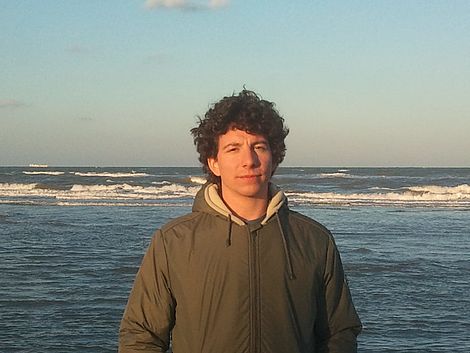
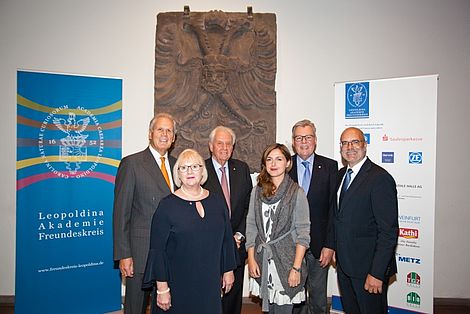
Stipendiatin Floriana Giallombardo
Bausch Scholarship 2017: F. Giallombardo
"Paolo Boccone at the Academia Naturae Curiosorum (1696): the visual culture of 17th century Natural History"
The Leopoldina Academy Circle of Friends reg. ass. awarded the Johann-Lorenz-Bausch-Scholarship for the second time in 2017. It is worth a maximum of 5,000 Euros and named after the Academy's founder Johann Lorenz Bausch. The scholarship is aimed at aspiring researchers who are working in the field of history of science, in the narrower and in the broader sense. The place of work during the maximum four-month funding period is the Leopoldina Centre for Science Research in Halle (Saale).
Floriana Giallombardo's research focuses on the work of the Italian naturalist and botanist Paolo Boccone (1633 - 1704).
Bocconi's intellectual activity is still largely unexplored, mainly because his professional activity was spread over many places (France, England, the Netherlands, Italy and the German countries) and did not receive continuous institutional support. However, these frequent changes of location and his travel activities were due to his research interest. Floriana Giallombardo is interested in Bocconi's far-reaching scientific network and analyses his travel activities that were the basis for his close contact with the emerging scientific societies and patrons, the resulting diverse scientific correspondence and his scientific publications, which were highly regarded during his time.
Through the analysis of the numerous printed articles by Boccone in the library of the Leopoldina but also in Halle's local libraries, Floriana Giallombardo was able to contribute to research on Boccone's importance for the history of science and his role as a mediator between northern and southern Europe.
The ceremonial awarding of the Johann-Lorenz-Bausch-Scholarship took place during the members’ assembly of the Leopoldina Academy Circle of Friends reg. ass. on the 9th of November 2017 in Schweinfurt.
A detailed abstract on Floriana Giallombardo's research activities as a Bausch fellow can be found here (pdf):
Bausch Scholarship 2016: Julia C. Böttcher
The Johann-Lorenz-Bausch-Scholarship, was awarded for the first time by the Leopoldina Academy Circle of Friends e. V., to Julia Carina Böttcher, M.A., Munich/Regensburg in 2016. The scholarship, worth 5,000 Euros, was awarded to her in April 2016 for her project “The Politics of Networking: Interest Representation and Nature Research in the Early Leopoldina”.
The aim is to analyse the behaviour of its members in representing their interests in various collectives (academy, city, empire), based on an understanding of the Academia Naturae Curiosorum as a successfully operating scholarly society. This is the first time that the pattern of action of the early modern scholar in the Old Empire has been reconstructed in the interwoven fields of activity of natural research and politics. Ms Böttcher conducted research on this at the Leopoldina Centre for Science Research in Halle from October 2016 to January 2017, taking a look at the documents available there.
The ceremonial presentation of the certificate to the scholarship holder took place during the annual event of the Leopoldina Academy Circle of Friends reg. ass. on the 11th of October 2016.
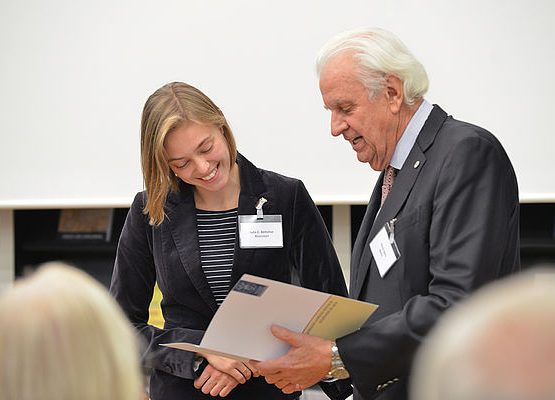
Portrait Johann-Lorenz-Bausch Picture: Leopoldina Archive
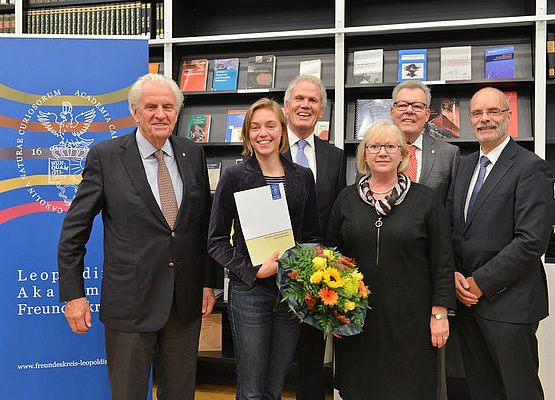
Portrait Johann-Lorenz-Bausch Picture: Leopoldina Archive
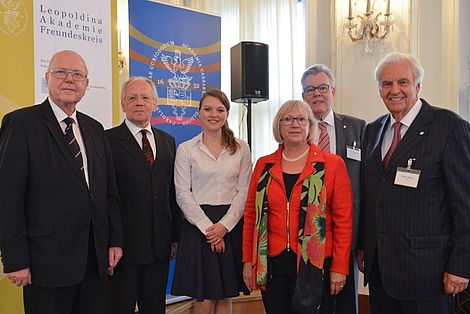
Portrait Johann-Lorenz-Bausch Picture: Leopoldina Archive
Advancement Award 2014
The Leopoldina Academy Circle of Friends reg. ass. awarded the “Johann-Lorenz-Bausch-Scholarship”, worth 5,000 Euros, to the extraordinary young scientist Katherina Kefales on the 1st of September 2014.
Katharina Kefales devoted her dissertation, which she conducted at the Institute for the History of Medicine in Heidelberg, to the Breslau city physicist Philipp Jacob Sachs von Löwenheim and his role in the development of the Academy in its early days. In her work, she dealt with both the personal and professional aspects of his life. She focused especially on his work within the Academia Naturae Curiosorum in the period after 1658, the year of his admission to the Academy.
The Leopoldina Academy Circle of Friends honoured Ms Kefalas' research work at its annual event on the 1st of September at the Alte Handelsbörse in Leipzig. Ms Kefalas received the award from the Chairperson of the Board Dr Horst Dietz.
At the time of the award ceremony, the awardee was working as an assistant doctor in paediatric surgery in Stuttgart.
Advancement Award 2012
On the 28th of October 2012, the Leopoldina Academy Circle of Friends reg. ass. awarded the “Johann Lorenz Bausch Prize” for the first time to a young scientist whose outstanding dissertation made a significant contribution to the historiography of the Academia Naturae Curiosorum in the first 50 years of its existence. The Leopoldina Academy Circle of Friends honours the research work of Dr des. Fabian Krämer at the opening of an exhibition on the “Early History of the Leopoldina in the 17th and 18th Centuries”.
Dr Krämer received his doctorate in February 2012 from the Faculty of Art and History at the Ludwig Maximilians University in Munich. His dissertation, entitled “How did a centaur get into early modern London? Reading and Observation in European Natural History Research, around 1550-1750” examines the relationship between reading and observation in early modern natural history research, using the discourse on monsters as an example. Central to the analysis is the European Academy movement of the second half of the 17th century. The research work provides new insights into the founding and publishing practice of the Academy journal Miscellanea Curiosa, which first appeared in 1670. Using sources from the environment of the Academia Naturae Curiosorum that have hardly been paid attention to so far, Dr Krämer makes changes in early modern natural history research in the course of the journal's founding tangible.
Dr Krämer declared his intention to use the prize money for a new research project in which so far neglected source material on the early phase of the Leopoldina is to be made accessible and evaluated. At the time of the award ceremony, the prize winner was working as a temporary academic councellor at the Chair of History of Science of Prof. Dr. Kärin Nickelsen, a member of the Leopoldina, at the LMU Munich, where a further research project on the history of the Leopoldina in the early modern period is being planned.
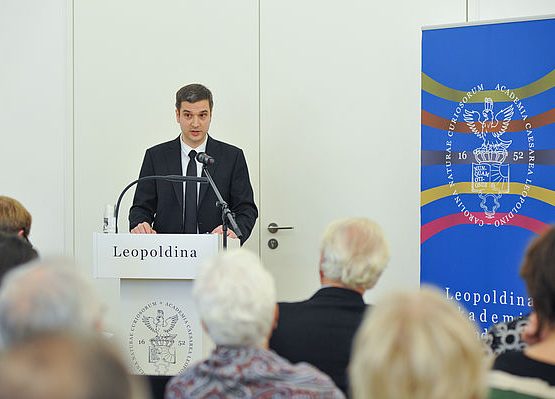
Portrait Johann-Lorenz-Bausch Picture: Leopoldina Archive
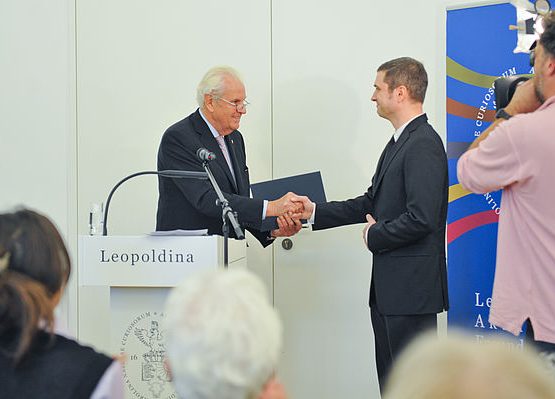
Portrait Johann-Lorenz-Bausch Picture: Leopoldina Archive
